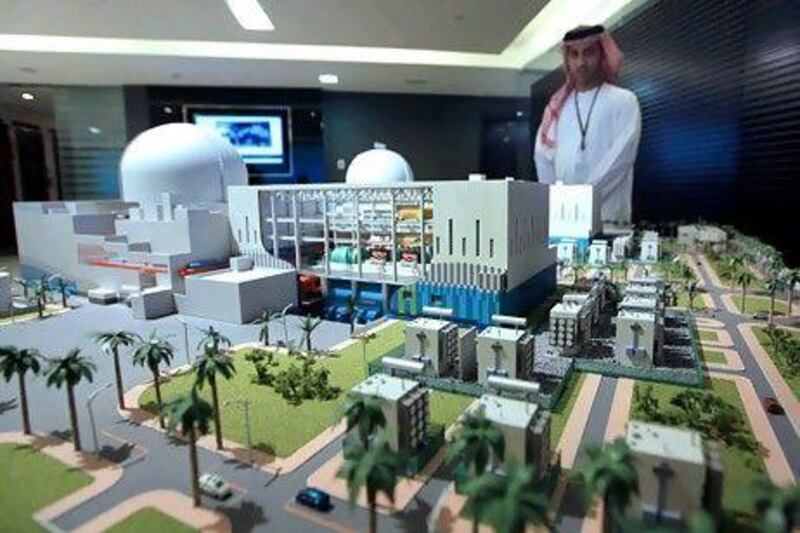The Emirates Nuclear Energy Corporation (Enec), the government body responsible for the construction of the GCC's first nuclear power plant, expects to gain approval next summer to build two of the four planned reactors.
Power for the people:
Nuclear The National looks at the UAE's journey towards nuclear power.Learn more
Construction will be preceded by fuel-purchasing contracts that could result in the UAE storing spent uranium.
The two reactors, to be built in a remote site in Braka, in Abu Dhabi's Western Region, should be completed in 2017, with each supplying 1,400 megawatts of electricity to the national grid.
Two further units are to be completed by 2020, bringing the total generating capacity of the US$20 billion (Dh73.46bn) programme to 5,600 megawatts.
Enec submitted its construction licence application to the Federal Authority for Nuclear Regulation (FANR) in September last year.
"We expect to have it completed around July 2012, that's when we expect to get permission to start the nuclear construction for units 1 and 2," said Fahad Al Qahtani, the director of internal affairs and communications at Enec, at a conference held yesterday by the Emirates Centre for Strategic Studies and Research.
If this timetable is met, construction should begin in November next year.The project hinges on approval from FANR, and the regulatory body has been granted full autonomy in its decision-making.
After the Fukushima nuclear disaster in March, in which the Japanese reactor was hit by a tsunami, FANR asked for a review of the Abu Dhabi site and the technology to be used at Braka by Kepco, the South Korean power company that is to build the plant.
Enec plans to submit this review by the end of this year, said Mr Al Qahtani.
Talks about obtaining uranium are under way with several supplier countries.
The UAE has already signed bilateral agreements that enable it to receive supplies from the US, the UK, Australia, Japan, France and South Korea, and is in negotiations with Russia over such a deal.
"The UAE is engaged in a few agreement negotiations with the supplier states. UAE is looking forward to signing such an agreement in the near future," said Hamad Al Kaabi, the UAE's permanent representative to the International Atomic Energy Agency.
More than one purchase agreement is possible, and Enec expects to sign its first contract within the first three months of next year, said Mr Al Qahtani, with a 15-year period of supply the most likely.
The contract would coincide with the finalisation of the financing concept for the project, he said.
Enec prefers a deal that allows spent fuel to be shipped back to the country of origin, an arrangement also referred to as "fuel leasing".
This preference would favour Russia and France, the only countries that have agreements to keep other nations' spent fuel.
But a decision on the model has yet to be taken, Mr Al Kaabi said, adding that even fuel storage in the UAE is an option.
"The UAE in principle favours an agreement for spent fuel to be sent back.
"But whether it's available or not, the UAE will consider other options, such as where the spent fuel will be stored in the UAE, in geological depository or otherwise," he said.





